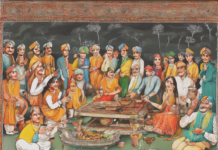As South Asians, our roots are deeply intertwined with our culture, traditions, and values. For many of us, these roots are not just a part of our identity; they are the very foundation of who we are. Whether we are first-generation immigrants or have lived in the diaspora for generations, there is a sense of pride and connection to our homeland that is undeniable.
Mera Desh Meri Mitti – this simple phrase holds within it a world of emotions and sentiments. Translated as “My Country, My Soil,” it encapsulates the essence of being connected to the land where our ancestors lived, loved, and thrived. In this article, we will delve into what it means to embrace our roots, the significance of staying connected to our homeland, and how this connection can enrich our lives in more ways than one.
The Significance of Roots and Heritage
Our roots serve as a foundation upon which we build our lives. They provide us with a sense of belonging, a connection to our past, and a roadmap for our future. When we embrace our roots and heritage, we are acknowledging the sacrifices and struggles of those who came before us, honoring their legacy, and carrying forward their traditions.
Heritage is not just about the customs and practices of our ancestors; it is also about the values and beliefs that have been passed down through generations. By embracing our heritage, we are preserving our cultural identity and ensuring that it remains alive for future generations to cherish and celebrate.
Staying Connected to Our Homeland
In today’s globalized world, staying connected to our homeland has become easier than ever. Thanks to technology and social media, we can remain in touch with family and friends, follow news and events in our country of origin, and participate in cultural celebrations and festivals from thousands of miles away.
Language is a powerful tool for staying connected to our homeland. By teaching our children our native language, we are not only preserving a vital aspect of our culture but also enabling them to communicate with relatives and understand the nuances of our rich linguistic heritage.
Visiting our homeland regularly, if possible, is another way to stay connected. Immersing ourselves in the sights, sounds, and smells of the land where our ancestors once walked can reignite that sense of belonging and reinforce our cultural identity.
Enriching Our Lives Through Roots
Embracing our roots can enrich our lives in numerous ways. It can give us a sense of pride in who we are and where we come from. It can provide us with a deeper understanding of our identity and help us navigate the complexities of living in a multicultural world. It can also foster a sense of community and belonging, as we connect with others who share similar backgrounds and experiences.
Cuisine is one of the most delicious ways to celebrate our roots. Cooking traditional dishes from our homeland not only connects us to our culinary heritage but also allows us to savor the flavors of home wherever we may be.
Arts and Cultural expressions such as music, dance, and literature are other avenues through which we can celebrate our roots. Participating in cultural events, attending concerts, or simply reading works by authors from our homeland can be a powerful way to stay connected and engaged with our heritage.
FAQs (Frequently Asked Questions)
Q: How can I teach my children about our roots and heritage?
A: You can start by sharing family stories, introducing them to traditional songs and dances, and celebrating cultural holidays together.
Q: What if I feel disconnected from my homeland?
A: Consider exploring your roots through genealogy, connecting with cultural organizations in your area, or even planning a trip to visit your homeland.
Q: How can I incorporate elements of my heritage into my daily life?
A: Try cooking traditional meals, learning a new language, displaying cultural artifacts in your home, or joining social groups that celebrate your heritage.
Q: Is it essential to pass down cultural traditions to future generations?
A: While it is not mandatory, transmitting cultural traditions can help children develop a sense of identity, pride, and belonging.
Q: What are some benefits of embracing our roots and heritage?
A: Benefits include a stronger sense of identity, connection to our past, a deeper understanding of our cultural values, and a sense of belonging to a larger community.
In conclusion, embracing our roots and staying connected to our heritage is a deeply personal journey that can bring immense joy, fulfillment, and a sense of belonging. Whether through language, cuisine, arts, or community engagement, there are countless ways to celebrate the rich tapestry of who we are and where we come from. Let the phrase Mera Desh Meri Mitti serve as a reminder of the deep roots that bind us to our homeland and the vibrant heritage that shapes our identity.









